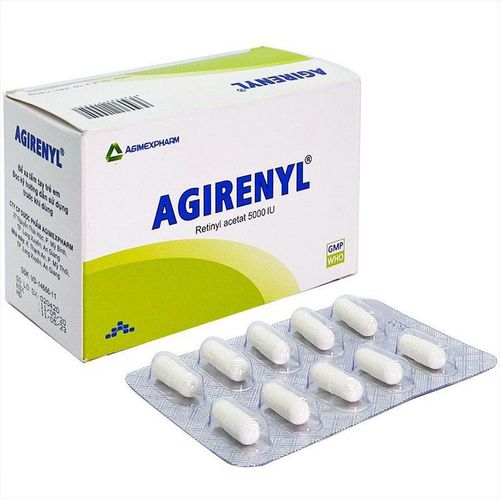This is an automatically translated article.
Vitamin A is one of the three important micronutrients needed by the body for healthy eyes. Vitamin A deficiency causes children to grow slowly, reduce their resistance, or suffer from respiratory and digestive diseases, night blindness, even corneal ulcers.1. The role of vitamin A
Vitamin A is one of the essential micronutrients, participating in many functions in the body. Vitamin A participates in the vision function of the eyes in low light conditions, anti-oxidant helps keep eyes healthy and promotes the health of the cornea and mucous membranes.Vitamin A is necessary for the protection of the integrity of the corneal epithelium of the eye, and the epithelial tissues under the skin, salivary glands, trachea, small intestine,...
In addition, vitamin A participates in the body's immunity process, increasing the body's resistance and fighting infections caused by viruses or bacteria. Vitamin A plays an important role in supporting the structure of lacrimal epithelial cells, protecting cell membranes against damage and hypoxia in free radicals.

Vitamin A có vai trò quan trọng đối với con người
2. Subjects prone to vitamin A deficiency
Vitamin A deficiency occurs when vitamin A stores are exhausted and vitamin A intake is insufficient. Subjects prone to vitamin A deficiency are those who have a diet deficient in vitamin A, suffer from bacterial or parasitic diseases and malnourished children,...
Due to vitamin A deficiency in the diet: The body cannot synthesize vitamin A on its own, so all vitamin A is obtained from food. If there are foods that are poor in vitamin A and lack fat, it will reduce vitamin A absorption. For young children, breast milk is an important source of vitamin A, so children who are not breastfed are easy to lead to vitamin A deficiency.
Infections and parasites: infectious diseases such as measles, diarrhea or respiratory infections, ... cause vitamin A deficiency or loss due to an increased need for vitamin A in the body to protect against pathogens. sick. The most common intestinal parasite infection is roundworm, which reduces the absorption of vitamin A. Protein malnutrition: malnourished children are often accompanied by vitamin A deficiency. Because protein deficiency affects metabolism, transport and use of vitamin A in the body. In addition, a lack of some micronutrients such as zinc can also affect vitamin A metabolism in the body.

Trẻ suy dinh dưỡng có nguy cơ thiếu hụt vitamin A
3. What disease does vitamin A deficiency cause?
Vitamin A deficiency makes children grow slowly, reduces the body's resistance to diseases, and is prone to serious infections and infections. Especially respiratory or gastrointestinal infections and measles. Vitamin A is involved in the visual function of the eyes, helping the eyes to see in low light conditions. With vitamin A deficiency, the eye's ability to see in low light will decrease. The phenomenon of "night blindness" occurs when it is dark, is an early clinical manifestation of vitamin A deficiency.
Vitamin A deficiency also reduces the production of dry skin and appears keratinized. Initially, the conjunctiva is dry and then the cornea is damaged, the epithelial cells are damaged along with a decrease in resistance, creating conditions for bacteria to invade.
4. Prevention of vitamin A deficiency
Ways to prevent vitamin A deficiency include:
Vitamin A supplementation through meals: for young children, it is necessary to breastfeed because breast milk is the best source of vitamin A. Make sure to eat enough nutrients, foods rich in vitamin A include: eggs, meat, shrimp, fish, water spinach, carrots, papaya, lettuce,... In addition, there should be enough oil in the meal. fat to support vitamin A absorption. Vitamin A capsule supplementation: high-dose vitamin A supplementation is performed for high-risk groups of subjects who receive vitamin A every 6 months. That target group includes: 6-36-month-old children and mothers after giving birth within 1 month. Prevention of infectious diseases: Infections, especially measles, cause very serious vitamin A deficiency. Therefore, prevention of the risk of vitamin A deficiency is very necessary and implemented in primary health care. Prevention of vitamin A deficiency needs to be combined with malnutrition prevention.

Trẻ được uống vitamin A định kỳ 6 tháng/lần
Vitamin A is a very necessary and important micronutrient of the body. Children or people who are malnourished, suffer from infections are susceptible to vitamin A deficiency. Therefore, to prevent vitamin A deficiency, it is necessary to eat enough, supplement with foods rich in vitamin A, and prevent vitamin A deficiency. infections, especially measles, in children.
Customers can directly go to Vinmec Health system nationwide to visit or contact the hotline here for support.













